
Born: 14th November 1924 in Patna Bihar
Fathers Name: Maulana Zafaruddin Qadri Rizvi
(Resident of Azimabad (Patna) and a disciple of Maulana Ahmad
Ph.D. 1953 AMU-Aligarh
M.A. (Arabic)-1949 AMU Aligarh
Reader:Islamic studies and Deputy Director of Institute of Islamic Studies: 1958
Professor and Chairman in Department of Arabic: 1968
Dean, Faculty of Arts: 1975
Ghalib Award: 1983
Books: Karbal Katha, Khutoot-e-Akbar, Saire-Dehli, Tazkarah Azurdah, Tazkarah Gulshan-e- Hind, Tazkarah Shoara-e-Farrukhabad, Diwaan-e-Huzoor, Ahwaal-e-Ghalib and Naqad-e-Ghalib. Edited: Zakir Sahib Ke Khat, Vol. III.
Prof. Mukhtaruddin Ahmad `Arzoo were born in a religious family of Maulana Zafaruddn Qadri Rizvi of Patna (also known as Azimabad in the past). He completed his primary education from Jamia Islamia Shamsul-Huda, Patna. He successfully completed the course of Maulvi and Alimiat from Madarsah examination board and secured distinction in Fazilat examination. He completed his matriculation from University of Patna in 1943 and joined Aligarh Muslim University for higher education. He completed M.A. in Arabic in 1949 and joined Ph.D. under the guidance of Maulana Abdul Aziz Memon, a word renowned Arabic scholar, Professor and Chairman Department of Arabic, AMU Aligarh and disciple of Deputy Nazir Ahmad. He became renowned after Editing the famous Ghalib Number of Aligarh Magazine.
After completing his Ph.D. he joined Department of Arabic as Lecturer in 1953. In the same year he received Rock Fuller Fellowship for research in Middle-East and England. He traveled to Germany, France, Egypt, Turkey, Syria, Lebanon and Iraq for educational purposes. He also stayed in Holland for couple of months and worked in Leiden University Library. He wrote the thesis under the guidance of Prof. Hamilton A.R. Gibb in Oxford University to receive his D.Phil.
In 1958, he became Reader in Islamic studies and Deputy Director of Institute of Islamic Studies at AMU Aligarh. He started journal of Islamic Studies and was its Editor for 12 years. In 1968 he became Professor and Chairman in Department of Arabic. He became Dean, faculty of Arts in 1975. He was Editor for MAJALLAT AL-MAJMA AL-ILMI AL-HINDI for number of years. For his contributions to Arabic and Farsi research work, he received Ghalib Award in 1983. After retirement he is staying in Aligarh and busy in his research. Well known critic and Urdu write Intizar Hussain said: “And how can I forget those two distinguished scholars, Dr Mukhtaruddin Aarzoo and Prof Asloob Ahmad Ansari, who after retirement have chosen to lead a secluded life focusing on research and study”.
On 10th April, 1998, Prof. Mukhtaruddin Ahmad Arzoo was appointed as Founding Vice-Chancellor of Maulana Mazharul Haq Arabic & Persian University in Patna.
=================================
Professor Ather H. Siddiqi
Former Chairman, Department of Zoology & Dean Faculty of Life Sciences
Aligarh
Six years ago, the Aligarh Alumni Association, New York Tristate, instituted the annual ‘Sir Syed Day Lifetime Achievement Award for Excellence in Literature, Poetry, Arts or the Sciences’, which has been presented in previous years to some of the most distinguished names in South Asia in various fields. This year, the association chose Prof. Mukhtar Uddin Ahmad, former Professor of Arabic and Dean Faculty of Arts and one of the most renowned, revered and senior academicians at Aligarh Muslim University, Aligarh for this honor. To spare Prof. Mukhtar Uddin the stress and inconvenience of traveling to the
It is a matter of great pleasure and honor for the author to write about the extraordinary scholarly contributions of one of the most illustrious sons of
Professor Mukhtar Uddin Ahmad was born on
Patna, successfully completing the course of Maulvi and Alimiat from Madarsah examination board. He stood first among all students in
Arabic at
After completing his Ph.D., he joined the Department of Arabic as Lecturer in 1953 and in the same year received a Rockefeller Fellowship which required him to work and study in the
His stay in
Furthermore, during his stay in
The late Malik Ram was a respected expert on Ghalib and his many works included the authoritative ‘Zikr-e-Ghalib' and countless contributions on Arabic, Persian and Urdu literature. He shared with Mukhtar Sahib the love of research, Ghalibiat, a spirit of collaborative work and a sense of dedication towards completion of a project. Mukhtar Sahib's collaboration with him on the publication of 'Karbal Katha' brought them even closer. A compilation of the hundreds of letters that they exchanged was done by Ali Jawad Zaidi and Mukhtar Sahib himself wrote about Malik Ram endearingly in 'Naqoosh, Lahore Shaqsiat Number’. In this article Mukhtar Sahib describes his sense of utter disbelief and awe on learning during a visit to Malik Ram's house that except for his eldest daughter Usha, his other three children had Muslim names; Bushra, Aftab and Salman. Malik Sahib sensed Mukhtar Sahib's astonishment and explained to him the origin of these names. They had one daughter Usha and when the second was born, the parents were told by a friend that if the newborn was named Bushra in a spirit of utmost sincerity, the next child would be a boy. Malik Ram Sahib’s mother was puzzled on hearing the name Bushra and asked her son if this wasn't a Muslim name to which he retorted that she also had given him a Muslim name i.e. Malik. Equally struck with disbelief was King Saud of Saudia Arabia who visited Bushra's school during a state visit to
Perhaps the reason that he didn't pursue this line of intellectual activity was that he wanted to be at least comparable in stature to Josh and Firaq and didn't want to be known as a mediocre poet.
Mukhtar Sahib is one of a select group of scholars, such as Dr. Nazir Ahmad, former Chairman, Department of Urdu, AMU, Dr. Abdul Sattar Siddiqi and Dr. Nisar Ahmad Farooqi whose primary field was not Urdu but who established a prestigious name for themselves in the field of Urdu research. During his student days, Mukhtar Sahib served as the Editor of the Ghalib number of the Aligarh Magazine, which was very well received and to this day is considered to be an important contribution in the field of ‘Ghalibiat’. Material published in the Ghalib number was later published as two books, 'Ahwal-e-Ghalib and ‘Naqd-e-Ghalib’ with addition of many other articles and revision of the old ones. Beside the discovery of Karbal Katha, already mentioned, and many other original Urdu manuscripts in various libraries of
Upon his return from abroad, Mukhtar Sahib became a Reader in the Department of Islamic studies and Director of the
During the last sixty plus years, Prof. Mukhtar Uddin has written innumerable books, research papers and made other scholarly contributions. Many academicians claim to write a few books and some odd number of research papers in their lifetime. In the case of Professor Mukhtar Uddin Sahib’s research output, a mere listing and indexing of all his contributions, including articles, edited books and original research papers, forms a book by itself, called ‘Mukhtar Nama’ compiled by Dr. Ata Khursheed and Meher Illahi Nadeem and published in 2002. It is quite amazing to see how he could have accomplished so much and how he still remains engaged in doing research and in pursuit of scholarly activities at his age. Among his major works/books in Urdu are: Karbal Katha, Khutoot-e-Akbar Allahabadi, Sair-e-Dehli, Tazkarah Azurdah, Tazkarah Gulshan-e-Hind Haideri, Tazkarah Shoara-e-Farrukhabad, Diwaan-e-Huzoor Azeemabadi, Ahwaal-e-Ghalib and Naqad-e-Ghalib. Edited: Zakir Sahib Ke Khat, Vol. III. This listing of his contributions is illustrative and not exhaustive by any means. Besides having published a large number of papers, he edited the Journal of Islamic Studies ‘MAJALLAT AL-MAJMA AL-ILMI AL-HINDI. He was a member of the Editorial Board: Ma'arif: Monthly Journal of Darul Musannefin,
Meer Academy, Lucknow in 1965, the Certificate of Honor from President of India, Ghalib Award in 1983, and was presented a commemorative volume ‘Nazr-e-Mukhtar edited by Dr Malik Ram in recognition of his literary and educational services on his 64th birth anniversary in 1988, as already referred to above, and was awarded the Imam Ahmad Raza Award in 2001. In 2005, the Ghalib Institute organized a function honoring him for his contributions to the literary world. His selection for receiving this year’s ‘Sir Syed Day Life Time Achievement Award’ from the Aligarh Alumni Association of New York Tristate is another befitting tribute to him.
Mukhtar Sahib is a great letter writer. He receives a lot of correspondence and promptly replies all letters as a matter of duty. All letters are earmarked on receipt and kept chronologically in separate large envelopes with dates when the replies were sent noted. The letters cover a wide range, from being personal, to containing questions about literary matters. His accumulated correspondence with many literary experts in Arabic and Urdu of the subcontinent, the
I have known Prof. Mukhtar Uddin for the last 60 years but he did not know me. He is senior to me by seven years in age but only by four years in terms of Aligarian seniority; he came to
letters written by famous men of literature. My love for Urdu books was more than enough reason to visit his library but there was no occasion to meet him. After my retirement, I was free to pursue my love of Urdu and wanted to meet Prof. Mukhtar Uddin. Ibne Sina academy provided a few but rare opportunities of meeting famous people at some of its regular meetings. Still I was in awe of Prof. Mukhtar Uddin and did not know how to pay a visit to his house and meet this great man at a personal level.
By this time, I had published my autobiography, ‘Main Kiya Meri Hayat Kiya.’ Prof. Mukhtar Uddin had also read it and thus he had become familiar with the name of an obscure novice dabbling in Urdu writing, who happened to be a science student and a teacher. I had heard that he had a very famous book - a dewan of Ghalib called Nuskha-e-Khawaja, edited and published by Prof. Syed Moeen Ur Rehman of the GC University of Lahore. I was very keen to see that book, and Taqreeb kuch tu behr-e-mulaqaat chahiye, I used this as a ruse to visit Prof. Mukhtar Uddin.
Meeting Prof. Mukhtar Uddin was a delightful experience for me. I found him to be very kind and courteous. He received me with great love and affection and willingly showed me the book I wanted to see and even lent it to me to take it home and see it at leisure. I was deeply moved by his generosity and his faith in me that I would take care of his precious and rare book, though it was our first meeting. This was the beginning of our relationship, which has developed into a very close association over the last 3-4 years. His good nature and will to help his students, fellow faculty members, and friends is rather remarkable. Once I suggested to Prof. Mukhtar Uddin to make a note of the books that he lends to people so easily and willingly. He replied. ‘Giving and lending books to people is my duty, to return them is the duty of the persons who borrow my books.’ I hope no body breaches his faith and confidence in human nature.
tayyar hai, tashreef lay aaiye’. He did not realize that he had continued reading all night and it was breakfast time. The book contained only 600 pages!!!
Though very soft spoken and a quiet person, he has a great sense of humor that comes out particularly in his Urdu essays, his diaries and travelogues which have been published from time to time in various Urdu periodicals in the sixties and seventies. Many anecdotes of his student days at
Mukhtar Sahib has been witness to an era of great turbulence and upheaval which saw the independence of the country as well as its partition. Throughout all the ups and down of political as well as other changes that altered the entire face of life at Aligarh compared to what it used to be when he joined the university as a young student in 1943, Mukhtar Sahib has steadfastedly remained loyal to Aligarh and has never entertained the idea of moving to greener pastures although he could have any lucrative job anywhere in the world just for asking and did indeed receive unsolicited offers of highly paid position at the University of Punjab, Pakistan, University of Wisconsin, Madison and Calcutta University. The changes that took place in the intellectual environment of the university particularly in the areas of literature and poetry due to the rise and fall of the Progressive Writer’s Movement in particular, the decline in the standards of education and in personal behaviors of students and faculty alike, deserve to be chronicled in the context of the life and times of a famous Aligarian like Mukhtar Sahib. Although he has written numerous articles from a first person perspective such as Mukhtar Uddin Arzoo - Khud Nawisht, Meray Bachpan Ka Azeemabad, Aligarh Kay Shub-o-Rooz, Yadoon Kay Chirag, Tulabai Aligarh Dayar-e Farang Main, Phool Khile Hain Gulshan Gulshan etc, there are not compiled in the form of a unified autobiographical compilation and published as a book. One sincerely hopes that he will write his autobiography in his inimitable style of subtle humor which will encapsulate the vast panorama of his eventful life against the backdrop of one of the most ‘PurAashaub’ era of our university.
Professor Ahmad’s life to date can be summed up in one line of a couplet of Allama Iqbal:
Narm dum-e-Guftagoo, Garm Dum-e-Justujoo
REFERENCES:
1. Nazr-e- Mukhtare, compiled by Malik Ram, Majlis-e-Nazr-e-Mukhtar,
2. Mukhtar-Nama compiled by Atta Khursheed and Mehr Elahi Nadeem, Aligarh Heritage Publications, Aligarh (2002)
3. Professor Mukhtar Uddin Ahmad, Muhaqqiq aur Danishwar, compiled by Shahid Mahli, Ghalib Institute,

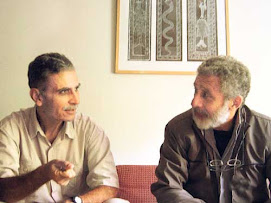
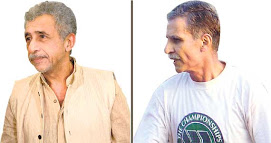



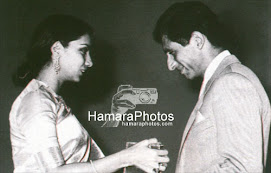
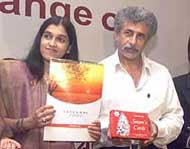










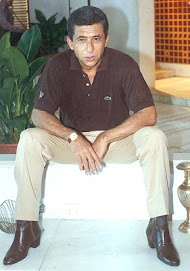


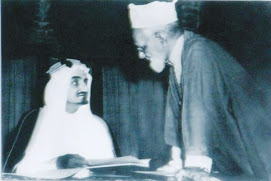

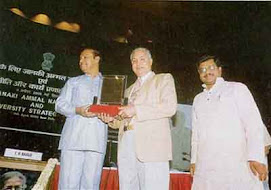
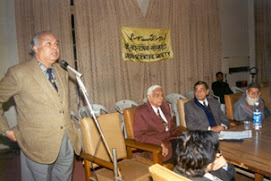
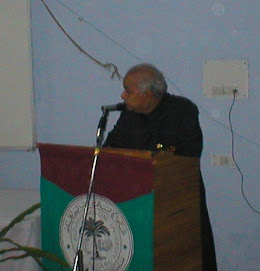














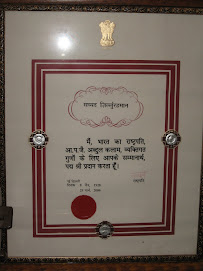
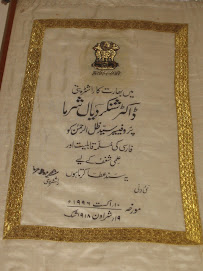



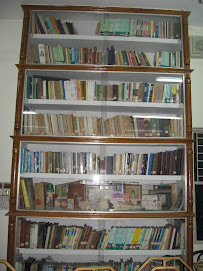
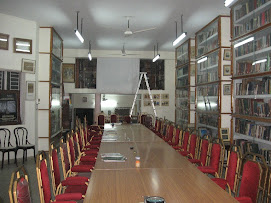
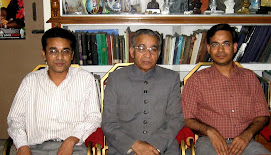
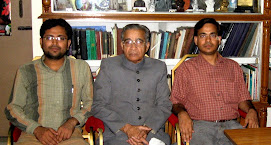




































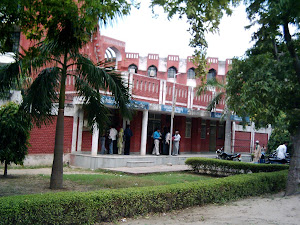
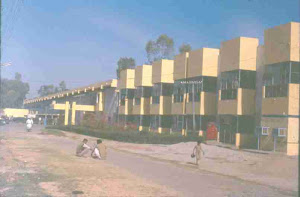


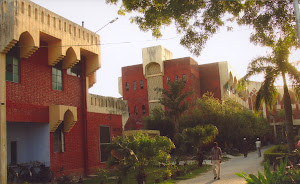
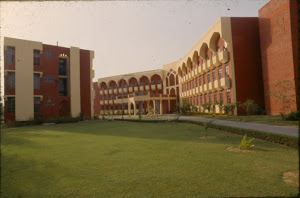





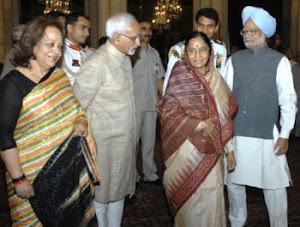
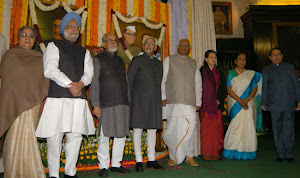
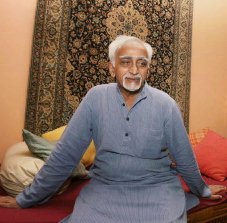
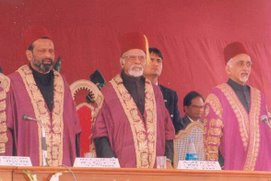

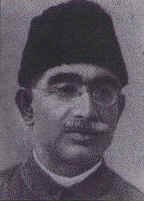




























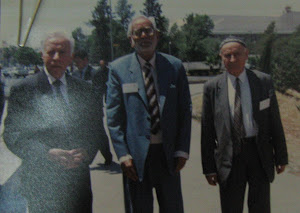







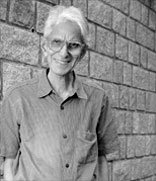






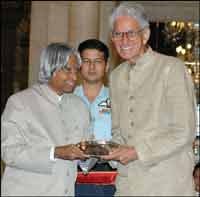



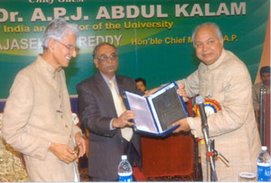

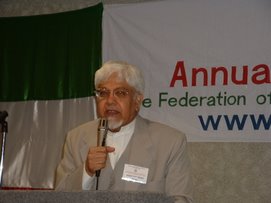
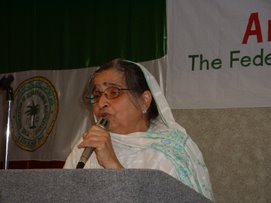
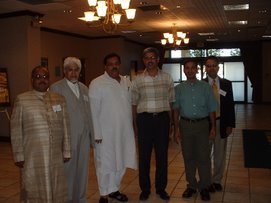
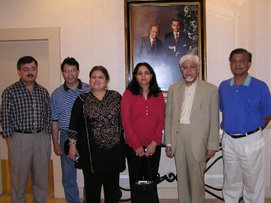




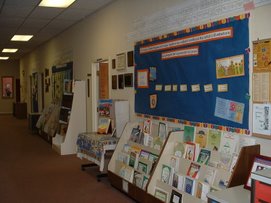



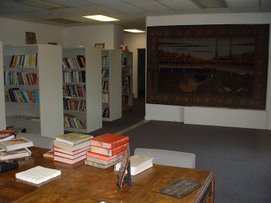

No comments:
Post a Comment